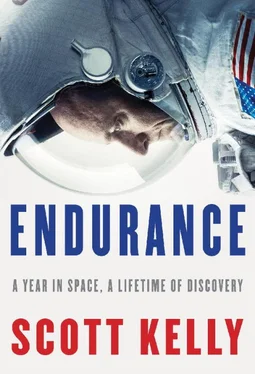Part of my annoyance has to do with the fact that even though we have two Seedras on board, the ground allows us to run only one of them, keeping the other in reserve as a backup. We use the one in Node 3 because it works relatively consistently; only if it goes out, or if we have more than six people on board (as will happen in September), will we be authorized to use both. Our CO 2level could come down to a much more tolerable level with the flip of a switch in Houston, and yet we can’t convince them to do this. I can’t help but to sometimes suspect the second Seedra is kept shut off to avoid the hassle of maintaining it from the ground. It’s hard to work up sympathy for flight controllers who make this decision while breathing relatively clean Earth air. A level of six millimeters of mercury seems unconscionably high to me. The Russian managers claim that the CO 2should be kept high deliberately because it helps to protect the crew from harmful effects of radiation. If there is any scientific basis for this claim, I have yet to see it. And because (I suspect) the cosmonauts are docked pay for complaining, they don’t complain.
If we are going to get to Mars, we are going to need a much better way to deal with CO 2. Using our current finicky system, a Mars crew would be in significant danger.
—
THE LAST PLANNING CONFERENCE of the day will be held at 7:30 p.m., and dinnertime is shortly after that. As it’s a Friday, we are looking forward to sharing a group dinner in the Russian segment, as always. Misha is usually the first one ready to start the weekend, and he floats over to the U.S. side in the afternoon to make a plan.
“What time should we start dinner, my brother?” he asks, his blue eyes wide and eager.
“How about eight?” I ask.
“Let’s make it seven forty-five,” he responds.
I agree.
After finishing up the DPC that evening and checking on an experiment, I give Amiko a quick call. “I’m heading over to Boondoggles,” I tell her, jokingly referring to the Russian segment as our neighborhood bar in Houston. She understands what I mean. I start gathering things to bring to Friday dinner in a big ziplock bag. I pack my own spoon and my own scissors for opening food bags. I pack foods to share, stuff from the bonus food container I brought up with me: canned trout, some irradiated Mexican meat, and a processed cheese similar to Cheez Whiz that Gennady loves. The Russians always share some tarry black caviar, for which I’ve developed a real taste, as well as some canned lobster meat. Samantha always brings good snacks, too—the Europeans have the best food.
With my goodie bag under my arm, I float into Node 1, then pass through the pressurized mating adapter (PMA-1), sort of a short, dark entryway between the U.S. and Russian segments. This entryway is not beautiful or spacious; it’s about six feet long and canted up at a steep angle. It’s quite narrow by design, and it’s made even narrower by the cargo we store there in white fabric bags. I pass through the Russian module called the FGB ( funktsionalno-gruzovoy blok, functional cargo block), then into the service module. There I find Gennady and Samantha watching a movie on a laptop while Anton floats horizontally to them, finishing up an experiment on the wall. On the laptop, a young woman’s face flickers across the screen, a look of apprehension wrinkling her brow, while a man’s voice speaks sternly in Russian.
“Hey, what are you guys watching?” I ask.
“It’s Fifty Shades of Grey, ” Samantha answers, “dubbed into Russian.” In English, Gennady welcomes me and thanks me for the food I’ve brought, then in Russian tries to convince Samantha that Fifty Shades is a great literary work.
“That’s ridiculous,” Samantha says, without taking her eyes off the screen. She and Gennady argue, half-jokingly, about the literary status of Fifty Shades in rapid-fire Russian as Misha emerges from the bathroom. Terry shows up with his own goodie bag and greets everyone.
Anton welcomes us. He flew MiGs in the Russian Air Force before being selected as a cosmonaut, making him one of the people I might have found myself face-to-face with in combat had geopolitics in the early 1990s played out differently. He is solid and dependable, both physically and technically. He has a goofy sense of humor and is a close talker, even for a Russian. He has a halting way of speaking English with pauses in unusual places in his sentences, but I’m sure my Russian sounds far worse. I once asked Anton what he would have done if his MiG-21 and my F-14 had been flying straight at each other on some fateful day—how would he have maneuvered his airplane to get an advantage on me? When I was training and flying as a Navy fighter pilot, these questions about MiGs and their capabilities consumed my fellow pilots and me. All we knew then was guesswork based on military intelligence. As it turns out, the same guesswork was happening on the Soviet side. From Anton and the other cosmonauts I’ve gotten the impression that they didn’t have much knowledge about our airplanes, and the training I got in dogfighting, flying against a very capable pilot in an F-16 pretending to be a MiG, was likely overkill by a wide margin. The Russian pilots are no less talented, they just had much less flight time than we did in our planes (I had more than 1,500 hours of experience in the F-14, while Anton has probably 400 hours in his MiG), presumably because their budgets were limited.
Anton and Misha acted as though Gennady were in charge as soon as he was on board, even though Anton is officially the Russian segment lead. Gennady has been, as always, awesome—things simply seem to go better when he is around, and everyone looks up to him as a natural leader. He doesn’t do anything to try to grab power, but there is something about him that makes people want to listen to him.
Misha has been great to fly with so far too. He has a true concern for other people, and when he asks me regularly how I am doing, he really wants to know. He cares about what’s going on in his friends’ lives, how they are feeling, and what he can do to help. What’s most important to him is friendship and camaraderie, and he brings esprit de corps to everything he does.
I’m often asked how well we get along with the Russians, and people never quite seem to believe me when I say there are no issues. People from our countries encounter cultural misunderstandings every day. To Russians, Americans can at first come across as naïve and weak. To Americans, Russians can seem stony and aloof, but I’ve learned this is just one layer. (I often think of a phrase I once read describing the Russian temperament as “the brotherhood of the downtrodden,” the idea that Russians are bound by their shared history of war and disaster. I thought I read it in The Master and Margarita by Mikhail Bulgakov, but I’ve never been able to find it in any translation; maybe I read it in Russian and this was my own translation.) We make an effort to learn about and respect one another’s cultures, and we have agreed to carry out this huge and challenging project together, so we work to understand and see the best in one another. The crewmates I fly with are crucial to nearly every aspect of my mission. Working with the right person can make the toughest day go well, and working with the wrong person can make the simplest task excruciatingly difficult. Depending on who is up here with me, my year in space could be needlessly perilous, fraught with conflict, or saturated with the everyday annoyance of a person you can’t quite click with and also can’t get away from. So far, I’ve been very lucky.
Once we’re all gathered around the table, Gennady clears his throat and makes a solemn face that lets us know he’s about to make a toast. The Russians are very formal about their toasts, and the first one of the evening is the most important. It’s always to honor the people present and our reason for being together.
Читать дальше












